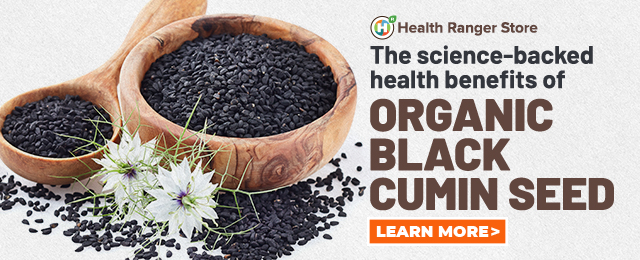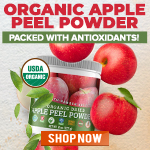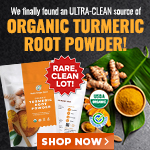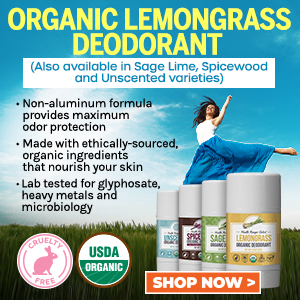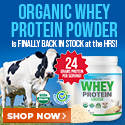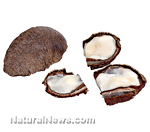
Nutritionist, Chef and Author (Part I): Challenging What You Think You Know about Nutrition
Friday, October 24, 2008 by: Kevin Gianni
Tags: nutrition, health news, Natural News
- TAKE IT DOWN Act advances in Congress amid free speech concerns
- Hospital staffers sound alarm after 10 nurses were diagnosed with BRAIN TUMORS
- Analysis: The coming economic collapse, a mass uprising and Trump's three secret weapons to halt the growing revolt
- Widespread social and economic unrest: Steve Quayle issues urgent financial warning of imminent asset collapse in new interview with Mike Adams
- Fauci is back in the limelight, and he’s busy promoting a future COVID or FLU pandemic
- Israeli lobbyists boast of controlling US national security policy in leaked AIPAC audio
- Mike Adams releases country western hit single: Goin’ Back in Time is Comin’ Home
- Tulsi Gabbard leads charge against the Biden regime’s global censorship of the 'Disinformation Dozen'
- Aerosolized bioweapons? Strange “diploid biomasses” falling out of the sky in Florida captured under the microscope
- Kiss Your Genetic Privacy Good-Bye! 23andMe Gets Green Light to Sell Your Intimate Genetic Details to Anyone They Want
- U.S. lawmakers investigate Meta over alleged China collaboration
- CLOT SHOT PLANDEMIC UNFOLDING: Fibrous, rubbery clots caused by covid injections have prion-like seeding activity
- New studies ignite debate: Fluoride linked to autism and ADHD, prompting calls for policy reassessment
- Children’s Health Defense stands firm: Based on SCIENCE and personal experiences, the MMR vaccine is NEITHER SAFE nor EFFECTIVE
- Defunding DEADLY mRNA jabs: Government funding for mRNA technology being scrutinized and sidelined until proven "safe and effective" for real
- Sen. Ron Johnson accuses CDC official in charge of COVID-19 injections of deleting records amid Congressional GOP scrutiny
- DEATH by VACCINE or face PRISON time: Canadian Freedom Convoy leaders CONVICTED for protesting forced vaccination during the Covid Plandemic
- Shedding light on the dark side of MMR vaccines: How vaccinated individuals SPREAD MEASLES & put the vulnerable at risk
- Fauci is back in the limelight, and he’s busy promoting a future COVID or FLU pandemic
- Tulsi Gabbard leads charge against the Biden regime’s global censorship of the 'Disinformation Dozen'
- Aerosolized bioweapons? Strange “diploid biomasses” falling out of the sky in Florida captured under the microscope
- Analysis: The coming economic collapse, a mass uprising and Trump's three secret weapons to halt the growing revolt
- Kiss Your Genetic Privacy Good-Bye! 23andMe Gets Green Light to Sell Your Intimate Genetic Details to Anyone They Want
- Widespread social and economic unrest: Steve Quayle issues urgent financial warning of imminent asset collapse in new interview with Mike Adams
- U.S. lawmakers investigate Meta over alleged China collaboration
- Mike Adams releases country western hit single: Goin’ Back in Time is Comin’ Home
- Chemtrails unveiled: How the CIA and Big Business are manipulating the weather for profit
- Curcumin’s ancient healing power supercharges muscle recovery, and its effects are compounded with anti-inflammatory foods and supplements
- Tulsi Gabbard takes aim at censorship: Justice for the ‘Disinformation Dozen’
- China’s counter-tariff strategies: A new chapter in the U.S.-China trade war
- CLOT SHOT PLANDEMIC UNFOLDING: Fibrous, rubbery clots caused by covid injections have prion-like seeding activity
- Israeli lobbyists boast of controlling US national security policy in leaked AIPAC audio
- European Court of Justice: Healthcare professionals who promoted or administered COVID-19 vaccines are CRIMINALLY LIABLE for any harm caused
- Defunding DEADLY mRNA jabs: Government funding for mRNA technology being scrutinized and sidelined until proven "safe and effective" for real
- DEATH by VACCINE or face PRISON time: Canadian Freedom Convoy leaders CONVICTED for protesting forced vaccination during the Covid Plandemic
- U.S. approves new Russian ambassador as diplomatic thaw continues
- Newly released JFK files reveal Pentagon's role in creating Lyme disease and covid in the same lab
- Analysis: The coming economic collapse, a mass uprising and Trump's three secret weapons to halt the growing revolt
- Mike Adams releases country western hit single: Goin’ Back in Time is Comin’ Home
- Aerosolized bioweapons? Strange “diploid biomasses” falling out of the sky in Florida captured under the microscope
- Kiss Your Genetic Privacy Good-Bye! 23andMe Gets Green Light to Sell Your Intimate Genetic Details to Anyone They Want
- European Court of Justice: Healthcare professionals who promoted or administered COVID-19 vaccines are CRIMINALLY LIABLE for any harm caused
- Federal employees whine over DOGE's new directive requiring them to do a 5-point summary of weekly accomplishments
- Dr. Mike Yeadon releases 15-minute testimony - WATCH - about genocidal intent of COVID “vaccines”
- The Health Ranger releases “Vaccine Zombie” song and music video, using AI-animated zombies for the music video
- U.S. approves new Russian ambassador as diplomatic thaw continues
- Government waste exposed: Hegseth supports Musk’s demand for accountability from federal workers
- Trump reverses course on Gaza plan, says “nobody is expelling Palestinians”
- Now you can HEAR chemistry: Health Ranger translates molecules into music in stunning video demonstration that will blow your mind (and your ears)
- 5 Simple steps to boost your brainpower: How to strengthen executive function in a distracted world
- EPA advisor admits the agency is funneling billions to climate groups ahead of Trump’s return to White House
- A lack of integrity in Academia: Harvard professor found GUILTY of fraudulent research to promote CRT theory
- Rep. Nancy Mace introduces bill to ban biological males from female facilities on federal property
- Survival 101: Effective EMF blocking techniques
- Red Cross issues warning to stop blood plasma donations from vaccinated people
- Scientists confirm: GENIUS brain function can be spontaneously unleashed in humans without any apparent cause
- EPA advisor admits the agency is funneling billions to climate groups ahead of Trump’s return to White House
- HYSSOP: What research reveals about the health benefits of this ancient holy herb
- Two containers with completed ballots fall out of truck in Florida
- Newly released JFK files reveal Pentagon's role in creating Lyme disease and covid in the same lab
- Global leaders unite to clamp down on “misinformation” with UN-backed Cascais Declaration
- BREAKING: 2025 NDAA authorizes mandatory military draft of WOMEN across America… as Pentagon pursues global NUCLEAR war with both Russia and China at the same time
- Michael Yon warns of a ZIONIST TAKEOVER in Trump’s second administration
- Mike Adams releases country western hit single: Goin’ Back in Time is Comin’ Home
- Ozempic and Wegovy weight loss drugs are injectable LIZARD VENOM PEPTIDES that may unleash a devastating wave of organ failure… side effects align with symptoms of SNAKE BITES
- The Health Ranger releases “Vaccine Zombie” song and music video, using AI-animated zombies for the music video
- BOMBSHELL: DNA testing kits are a SCAM to develop ethnic-specific bioweapons
- Israeli soldiers accused of even more torture and abuse in the West Bank
- These 13 countries just signed an agreement to engineer a global FAMINE by destroying food supply
- NASA admits that climate change occurs because of changes in Earth’s solar orbit, and NOT because of SUVs and fossil fuels
- RFK Jr. clears key hurdle: Sen. Susan Collins backs controversial HHS nominee, signaling a new era for health policy
- Sermon 30: How Jesus reveals Caesar’s FAKE CURRENCY and FALSE AUTHORITY
Renegade Roundtable with Sally Fallon, nutrition researcher, chef, journalist and author of Nourishing Traditions-The Cookbook That Challenges Politically Correct Nutrition and Diet Dictocrats.
Kevin: So Sally, I want to welcome you to the program.
Sally: Thank you. Thank you for having me.
Kevin: Why don't we start very quickly by just explaining a little bit about how you got into this and then we'll get into some of the really cool stuff I want to talk about today.
Sally: Well, I read Dr. Weston Price's book back in the early 1970s and at that time I was starting out with my own family. I carried out this reckless experiment on my own children and fed them according to those principles and proved to myself that this is the healthy way to go. I also liked to cook very much, so I was able to put my love of cooking together with these principles in the book "Nourishing Traditions." I often say that a lot of people who are writing books about nutrition and health and food have not spent a lot of time in the kitchen and don't do much cooking. I think it's very important for people who are telling families how to eat and how to cook to have done that themselves.
Kevin: Great. Now the Weston A. Price Foundation, you were the president of that?
Sally: Yes. We founded the Weston A. Price Foundation in 1999. It was just after this second edition of "Nourishing Traditions" had come out. We founded it because of our great concern of the continuing stream of misinformation that was coming from the government and all of the various official health agencies and so forth, especially as it was being applied to children. What I call this "prudent diet," this low-fat, high-fiber, low animal food diet had become official government policy and now they were telling people to feed this diet to children. We knew that this was a disaster in the making so we set up the Weston A. Price Foundation specifically to provide accurate information to young families.
Kevin: Great. Can you tell us a little bit about what Weston Price taught and what you learned from that?
Sally: Yes. Weston Price was actually a dentist and he had this idea of going around the world and looking at healthy people and finding out what they actually ate. The way he determined whether a population was healthy was he looked at their teeth. It's a very accurate and easy way to see what their general level of health was. He looked in their mouth, he counted cavities and he also looked for what he called "dental deformities," that would be crowded or crooked teeth. He found 14 population groups that had excellent dental health, that is virtually no cavities and every member of the society had broad faces and naturally straight teeth. This told him that they were healthy and that their bodies had been formed properly.
Then he looked at their diets. The diets were all very different. Some had dairy foods and some had a lot of fruits and vegetables and some up in the north had seals and fish and stuff. So the particulars of the diet were different. But he found some underlying characteristics that were the same in every diet. The key one was the very high levels of what we call fat-soluble vitamins -- vitamins A, D and K -- which we get only from animal fats from grass-fed animals and organ meats and certain types of seafoods, mostly foods that we're being told we shouldn't eat today. Dr. Price found that these were the most important foods for us to eat. So foods like liver and eggs and butter and cod liver oil, fish organs and things like that. So it's foods that we tend to avoid in this culture because of
the fear of cholesterol and saturated fats.
Kevin: What is the research that you found about cholesterol? I know that you're very outspoken about that and I'd love to hear the details that you came up with.
Sally: This whole notion that cholesterol is our enemy was very carefully inculcated into the culture by the vegetable oil industry in order to demonize their competition, which is animal fats and to demonize the saturated plant fats like coconut oil.
It's just completely scientific. When you look at the studies that they site in support of their argument, that cholesterol and saturated fats are bad, you find completely junk science. It's not good science. It doesn't dovetail with what we know about cholesterol and how important it is in the body. Every cell in your body needs cholesterol to make it waterproof and cholesterol is what we make hormones out of and vitamin D and bile salts. The brain is extremely rich in cholesterol and cannot function without cholesterol. Memory is formed using cholesterol. The receptors for the "feel-good" chemicals like serotonin cannot work without cholesterol. So it's just a crucial component of our bodies. It's very important for growing children, because they can't make cholesterol very well, so they need it in their diet.
We know this. We know this from lots and lots of good science over the past 60 years. But the propaganda has tried to get people not to believe the science, or not to even know about science.
Kevin: Right. And so it's just not sufficient, in your research, for your liver to produce the cholesterol that you need?
Sally: Well for growing children, they do need cholesterol in their diets. Mother's milk is extremely rich in cholesterol and it has a special enzyme that helps the baby absorb all of the cholesterol. When a child is fed on low-fat dairy or soymilk or something like that, they're not getting the cholesterol they need to form their brains and guts properly, the two areas where you need the most cholesterol.
Adults can make cholesterol. They don't actually have to have it in their diet. But the thing is that the high-cholesterol foods are the foods that contain these fat- soluble vitamins that are so crucial. So if they're avoiding cholesterol in their diet they will not be getting some really important vitamins in their diet.
Kevin: Gotcha. What about raw dairy?
Sally: Well, we've taken some very controversial stands.
Kevin: Yeah, I love it.
Sally: Very anti-establishment stands. And one of these is our endorsement of raw milk and raw dairy foods. We have been able to put together a lot of good science showing that raw milk is healthier, much healthier, and much more digestible, and also much safer than pasteurized milk. Just to give you an example, we recently posted a review of 102 studies purportedly that show that raw milk is dangerous. We went through each study and showed that in almost 95% of those studies they were just very biased and it was a foregone conclusion. They did not actually show that raw milk had caused disease. But they stated that it had in the abstract of the study. So there's a tremendous amount of bias and prejudice against raw milk and this is reflected in the scientific literature.
Kevin: With a lot of the information that you were finding in those studies, was it
bacterial infections or was it promoting poor health?
Sally: Mostly what you find in the literature when you do a search for raw milk is
studies saying that raw milk caused this illness or this outbreak. So they're blaming the bacteria in the raw milk. In virtually all of them there's either no sample or no statistical relationship or there is a tremendous amount of bias in choosing the subjects so that they can create a statistical relationship. And we were able to show that in most of the studies. And we've also been able to collect together the science of the last 40 years which indicates that raw milk is just an amazing substance that contains a number of enzymes and components and special fats and special proteins, special carbohydrates and bacteria, all of which work together synergistically to get rid of pathogens and to prime the immune system to be immune for life to any pathogen that we've come in contact with.
Kevin: And so what's happening to the milk when it's heated and pasteurized and
homogenized and all that, like what's keeping the raw milk in its natural state and what's in it that's not being destroyed?
Sally: Well all of these components, if you see pictures of them, like a typical enzyme in milk is lactoferrin and this is an amazing looking component that has got all these twists and turns and very precise folds and when you past... and by the way and different electrical charges, each little fold has a different electrical charge, and when you pasteurize, you just mess all that up. You distort the molecule. You change the angles of the folds. You change the electrical charges, and it just can't work anymore. And lactoferrin works by stealing iron away from pathogens and does a double duty by helping the infant absorb the iron. That's why people drinking raw milk don't get anemia whereas if you drink pasteurized milk you tend to get anemia because you can't absorb the iron. And that's just
one of dozens of components that's kind of smashed and warped when you pasteurize and I do want to stress that pasteurization is not the same as gently heating something on your stove. It's a very rapid heating and then the milk goes through homogenization which is a very high pressure, pressing so to speak. And all of this is kind of a brutal technology applied to nature's most delicate food, raw milk.
Kevin: And I have a question for you. You may or may not know this but I've always wondered and I've never really questioned it too much because we don't actually eat, really, anything pasteurized, but is flash pasteurization the same as pasteurization?
Sally: There are different ways of pasteurizing. There's something called the holdertechnique where they heat it slowly and then hold it at that temperature for
about fifteen minutes to half an hour. And there's flash pasteurization which heats it very rapidly and only holds it for a few seconds. So it's unclear which is worse, whether there's any advantage, nutritional advantage to one or the other, but both of the methods get rid of the enzymes and that is the test for successful pasteurization. That the enzymes aren't there. They test for phosphatase and if it's gone they assume that it's pasteurized.
Kevin: Great.
Sally: And of course then we have ultra-pasteurization which more and more of the dairies are going to because, they are going to it for two reasons. One because the milk has a longer shelf life and two because they found that pasteurization actually doesn't get rid of all the pathogens. They've developed heat resistance; Mother Nature has a way of adjusting to our technologies. And ultra- pasteurization takes the milk above the boiling temperature, up to 230 degrees. Now you actually can't do that in your kitchen. You can boil the milk but in never goes above 212. So this is a totally unnatural process and completely deadens the milk, there's just nothing left in the way of living components with ultra- pasteurization. It's just stuff and by the way, most of the organic milk is ultra-pasteurized.
Kevin: Really?
Sally: Yes, so why go to the trouble of grass feeding your cows and using organic feed and so forth if you're going to ultra-pasteurize it?
To read the rest of this transcript for free as well as access a full archive of information by health experts on abundance, optimum health, and longevity just like Sally Fallon, please visit http://www.renegadehealth.com/inner-circle.p... for a free 30 day trial.
About the author
Kevin Gianni is a health advocate, author and speaker. He has helped thousands of people in over 85 countries learn how to take control of their health--and keep it. To view his popular internet TV Show "The Renegade Health Show" (and get a free gift!) with commentary on natural health issues, vegan and raw food diets, holistic nutrition and more click here.His book, "The Busy Person's Fitness Solution," is a step-by-step guide to optimum health for the time and energy-strapped. To find out more about abundance, optimum health and self motivation click here... or you're interested in the vegan and raw food diet and cutting edge holistic nutrition click here. For access to free interviews, downloads and a complete bodyweight exercise archive visit www.LiveAwesome.com.
Nutrition at FETCH.news
Get independent news alerts on natural cures, food lab tests, cannabis medicine, science, robotics, drones, privacy and more.
Take Action: Support Natural News by linking to this article from your website
Permalink to this article:
Embed article link: (copy HTML code below):
Reprinting this article:
Non-commercial use OK, cite NaturalNews.com with clickable link.
Follow Natural News on Facebook, Twitter, Google Plus, and Pinterest
Science News & Studies
Medicine News and Information
Food News & Studies
Health News & Studies
Herbs News & Information
Pollution News & Studies
Cancer News & Studies
Climate News & Studies
Survival News & Information
Gear News & Information
News covering technology, stocks, hackers, and more



"Big Tech and mainstream media are constantly trying to silence the independent voices that dare to bring you the truth about toxic food ingredients, dangerous medications and the failed, fraudulent science of the profit-driven medical establishment.
Email is one of the best ways to make sure you stay informed, without the censorship of the tech giants (Google, Apple, Facebook, Twitter, YouTube, etc.). Stay informed and you'll even likely learn information that may help save your own life."
–The Health Ranger, Mike Adams











